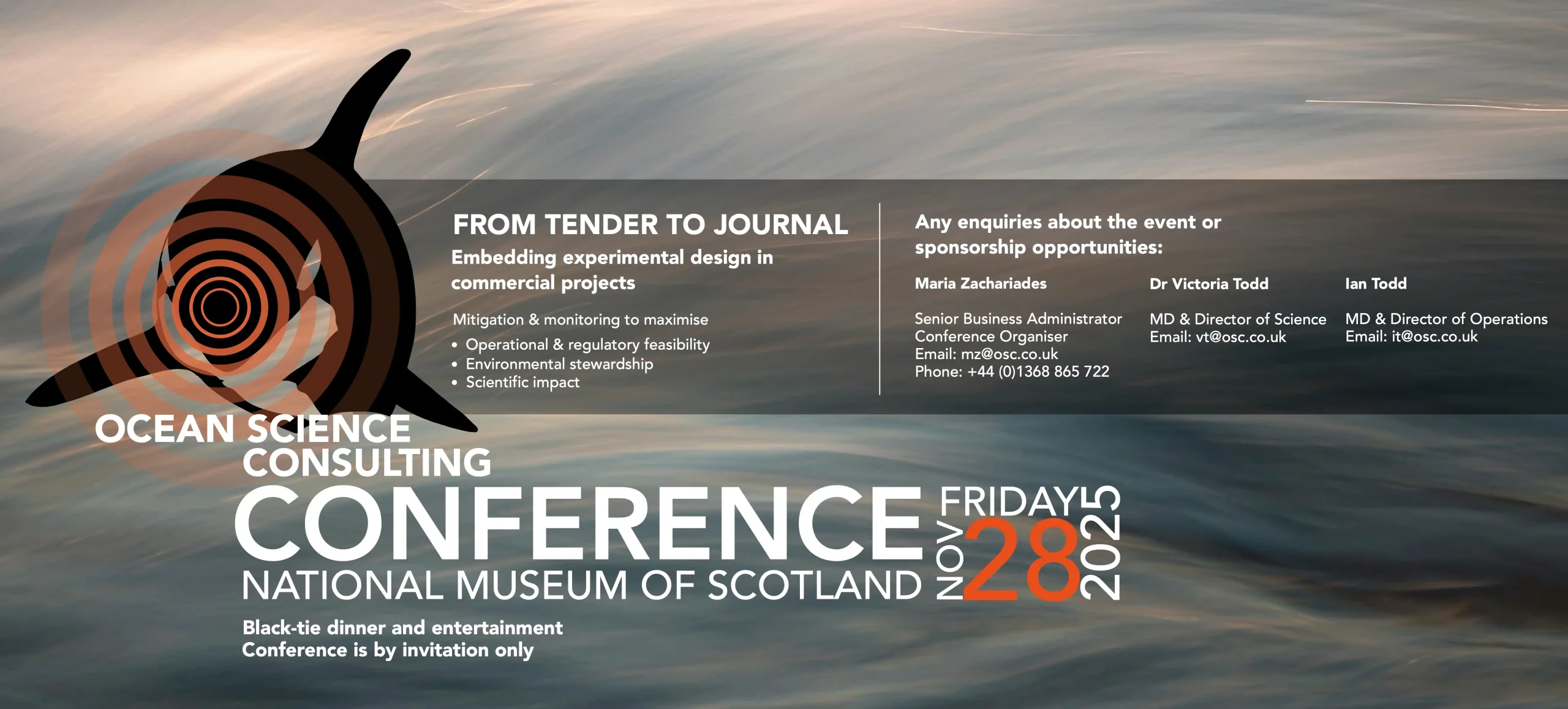All is possible. We’re OSC.™
Ocean Science Consulting NZ (Asia-Pacific) Limited (OSC-NZ) is the Asia-Pacific regional branch of Ocean Science Consulting Limited (OSC), a technology-focussed marine science company based in Dunbar, Scotland that has been providing environmental services worldwide to a range of clients and marine industries since its establishment in 2004.

Incorporated originally in 2004, OSC is a privately-owned international marine science company that specialises in the collection, analysis, and assessment of underwater noise and its impact on marine mammals and other wildlife. We provide marine consultancy services during different stages of Environmental Impact Assessments (EIAs) for the offshore energy (oil & gas, renewables, etc.), construction, fisheries, and defence sectors.
OSC is ISO certified for 9001:2015, 14001:2015, and 45001:2018.
OSC-NZ’s competitive edge is built on OSC’s core values, knowledge, experience, and peerless reputation. The company is detail focused and believes in quality, not quantity. For clients operating in the New Zealand region in particular, OSC-NZ offers unrivalled technical expertise, and an understanding of the requirements of the Seismic Code and other marine regulations, relationships with key government agencies & stakeholder organisations, and commitment to the highest environmental standards.

OSC produced the definitive manual on MMO and PAM, and provided expert technical advice to the New Zealand government in the development of the DOC2012 and 2013 Code of Conduct. In addition to implementation of New Zealand’s 2013 Code of Conduct for Minimising Acoustic Disturbance to Marine Mammals from Seismic Survey Operations, OSC-NZ works to environmental guidelines such as those set out by the Department of the Environment, Water, Heritage and Arts for seismic surveys in Australian waters.
OSC has trained thousands of MMO & PAM personnel worldwide, and wrote the MMO and PAM industry Handbook. OSC-NZ also run DOC accredited MMO & PAM training courses. For more information see our training page.
Uniquely, we invest up to 80% of profits into production of high-calibre peer-reviewed scientific research papers, if clients release us from Non-Disclosure Agreement, NDA, intended to influence marine policy and permit/licence decisions with evidence-based investigations, so clients fund this endeavour indirectly when they contract OSC’s commercial services. Publishing industry data in journals ensures scientific transparency, impresses regulators, and improves clients’ environmental credentials. To the best of our knowledge, unlike any other environmental consultancy worldwide, OSC’s research staff are awarded up to 80% protected research time to write research papers from industry data; we effectively fund our own post docs.
Since 2004, OSC has been conducting decommissioning field studies for a consortium of O&G clients. Research indicates strongly that offshore O&G installations/structures provide reliable feeding habitats for marine mammals, support diverse assemblages of species, and enhance reproduction of fish and invertebrates (e.g. Todd et al., 2009; Todd et al., 2016; Todd et al., 2018; Todd et al., 2020a; Todd et al., 2020b), which suggests that some well-placed offshore drilling rigs and production platforms should be left in situ at the end of their operational lifetimes.
In 2014, OSC undertook the definitive review on dredging and marine mammals on the back of supplying services to Shell for an ongoing project that has lasted over a decade (Todd et al., 2015).
Todd, V.L.G., Pearse, W.D., Tregenza, N.C., and Todd, I.B. (2009): Diel echolocation activity of harbour porpoises (Phocoena phocoena) around North Sea offshore gas installations. ICES Journal of Marine Science 66, 734 – 745.
Todd, V.L.G., Todd, I.B., Gardiner, J.C., Morrin, E.C.N., MacPherson, N.A., DiMarzio, N.A., and Thomsen, F. (2015): A review of direct and indirect impacts of marine dredging activities on marine mammals. ICES Journal of Marine Science 72, 328-340.
Todd, V.L.G., Warley, J.C., and Todd, I.B. (2016): Meals on wheels? A decade of megafaunal visual and real-time Passive Acoustic Monitoring detections from on-tow and stationary offshore oil and gas rigs and platforms in the North and Irish Seas. PLoS ONE 11, 25.
Todd, V.L.G., Lavallin, E.W., and Macreadie, P.I. (2018): Quantitative analysis of fish and invertebrate assemblage dynamics in association with a North Sea oil and gas installation complex. Marine Environmental Research 142, 69-79.
Todd, V.L.G., Lazar, L., Williamson, L.D., Peters, I., Cox, S.E., Todd, I.B., Macreadie, P.I., and McLean, D.L. (2020a): Underwater visual records of marine megafauna around offshore anthropogenic structures. Frontiers in Marine Science 7, 230.
Todd, V.L.G., Williamson, L.D., Cox, S.E., Todd, I.B., and Macreadie, P.I. (2020b): Characterising the first wave of fish and invertebrate colonisation on a new offshore petroleum platform. ICES Journal of Marine Science 77, 1127-1136.
Scientia potentia est™
We won't tell you what you want to hear to tick a box, we'll tell you what you need to know to get the job done properly™